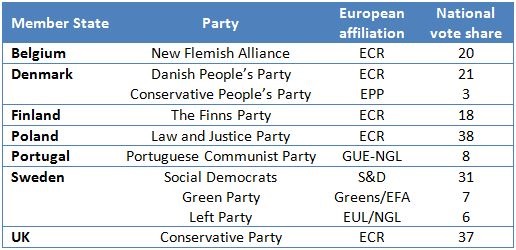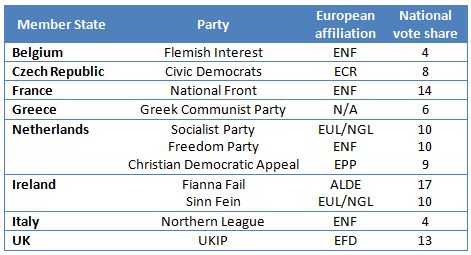 A number of Eurosceptic parties across the continent have called for the EU budget to be reduced. Giacomo Benedetto writes that although Euroscepticism does not always coincide with support for cutting the budget, the existence of Eurosceptic parties in several states could pose a serious problem for future budget negotiations. He highlights that based on the outcomes of previous negotiations, Euroscepticism in the United Kingdom, Denmark, Sweden, and possibly Finland and the Netherlands, is likely to have a particularly significant impact on proposed reforms to the revenue side of the EU budget.
A number of Eurosceptic parties across the continent have called for the EU budget to be reduced. Giacomo Benedetto writes that although Euroscepticism does not always coincide with support for cutting the budget, the existence of Eurosceptic parties in several states could pose a serious problem for future budget negotiations. He highlights that based on the outcomes of previous negotiations, Euroscepticism in the United Kingdom, Denmark, Sweden, and possibly Finland and the Netherlands, is likely to have a particularly significant impact on proposed reforms to the revenue side of the EU budget.
In my volume co-edited with Simona Milio (published in 2012) I write that reform to the EU’s budget is prone to a strong status quo bias due to the need for unanimity among the EU’s 28 member states for agreeing changes to the EU’s revenue and maximum expenditure. Since no agreement on change would result in continuity, any changes are modest; a single member state unsure of the consequences of change has a strong incentive to block agreement. This particularly affects reforms to the EU’s revenue side or own resources (i.e. where the EU gets the money before it spends it), because changes to the revenue base also require ratification by every member state’s national parliament. While much attention is focused on EU expenditure, it is the notion of paying into the EU that lies at the root of disputes on the EU budget, hence the desire for revenue reform.
At the end of 2013, to propose solutions, the EU established a High Level Group on Own Resources. It will report during 2016 to an Inter-Parliamentary Assembly composed of MEPs and representatives of national parliaments. Ahead of any proposals, this blog looks at the likely effect of Euroscepticism on attempts to reform the EU’s revenue system. Although Euroscepticism does not always cohere with budget-scepticism, reform to the EU’s revenue system could face challenges in several member states.
Types of Euroscepticism
Since its emergence in the early 1990s, application of the word ‘Euroscepticism’ has been general. Paul Taggart and Aleks Szczerbiak have previously tried to categorise it as either ‘hard’ Euroscepticism – which is opposition to European integration based on principle – or ‘soft’ Euroscepticism, which, short of outright opposition, is a wish to block further steps towards integration.
Petr Kopecky and Cas Mudde argue that Euroscepticism is much more fluid and can move between sub-categories that include ‘Eurorejectionism’, ‘Europhobia’ and ‘Europragmatism’. Whereas some parties specialise in hard Euroscepticism, either as a single issue or as part of a wider nationalist or anti-capitalist response, sometimes choosing Euroscepticism as a means to differentiate themselves from the mainstream, elsewhere Euroscepticism is expressed through factions or currents in larger political parties that are pro-system.
Opposition to European integration can be moderate or radical, can vary according to the EU policy, and can change according to circumstance and time. While right-wing Eurosceptics have become more Eurosceptic over time, some political families like that of the Green parties moved away from Euroscepticism in the 1980s. Evidence from an analysis by Agnes Batory and Nick Sitter, as well as a study by myself and Lucia Quaglia, suggests that Agrarian or Communist parties, respectively, have shifted away from Euroscepticism in order for them to attract votes or acceptance by more pro-European coalition partners. In other words, Euroscepticism can be moderated by vote-seeking or coalition-seeking behaviour.
Eurosceptics and EU revenue
In terms of their attitude to EU revenue, Eurosceptics are relevant in Member States when they are either coalition-seeking or vote-seeking in such a way as to persuade other political parties to adopt soft Euroscepticism to compete against them. The latter is what Giovanni Sartori referred to as the ‘blackmail potential’ of more extreme parties, though entering a coalition may moderate a party’s Euroscepticism. In some member states, Euroscepticism is present but does not affect EU budget matters, perhaps because the country is a net recipient from EU spending.
In approving the EU’s annual budgets since the entry into force of the Lisbon Treaty in 2009, the United Kingdom, the Netherlands, Denmark, and Sweden have taken notably sceptical positions. They were able to block agreement if France, Germany, Austria or Finland chose to join them. The array of Euroscepticism in these eight countries can therefore have an effect during any process aimed at reforming EU revenue.
A proxy for estimating positions on this question is the result of a vote in the European Parliament to approve the new Own Resources Decision of 2014, which mostly reconfirmed the existing revenue structure. The soft Eurosceptic parliamentary group of European Conservatives and Reformists requested a roll call vote on a paragraph in report A7-0270/2014 of the regulation to implement the Decision. The paragraph called for the future introduction of ‘real own resources’, essentially taxes, to replace the current system, which is mostly based on contributions linked to national wealth. This was approved by most of the MEPs from the ALDE (Liberal), EPP (Christian Democrat), S&D (Social Democrat), and G/EFA (Green) groups.
Those against included most of the ECR (Conservative) and EFD (hard Eurosceptic) groups, and a minority from other groups. From parties in government or allied to government in member states at the time of writing, these included the following:
Table 1: Parties currently in government or allied to an EU government that opposed the introduction of ‘real own resources’

Note: Although the New Flemish Alliance is part of the Belgian government, if necessary the other Belgian parties can construct majorities on EU matters by relying on the Socialists and Greens, currently in opposition. Although the Portuguese Communists provide external support for the Portuguese Centre-Left government, the government is able to rely on the centre-right opposition to provide majorities on EU matters. For more information on the political groups, see: European United Left–Nordic Green Left (GUE-NGL); The Greens–European Free Alliance (Greens/EFA); Progressive Alliance of Socialists and Democrats (S&D); Alliance of Liberals and Democrats for Europe (ALDE); European People’s Party (EPP); European Conservatives and Reformists(ECR); Europe of Freedom and Direct Democracy (EFDD – formerly EFD); Europe of Nations and Freedom (ENF).
From parties in government in Member States at the time of the vote (April 2014) but which are in opposition at the time of writing, those voting against ‘real own resources included the following:
Table 2: Parties that were in government or allied to an EU government in April 2014 that opposed the introduction of ‘real own resources’
Note: Although Sweden is governed by a coalition of Social Democrats and Greens, this has the support of the Left Party. The government is a minority government “tolerated” by the centre-right opposition that is led by the Conservative Moderates. For more information on the political groups, see: European United Left–Nordic Green Left (GUE-NGL); The Greens–European Free Alliance (Greens/EFA); Progressive Alliance of Socialists and Democrats (S&D); Alliance of Liberals and Democrats for Europe (ALDE); European People’s Party (EPP); European Conservatives and Reformists(ECR); Europe of Freedom and Direct Democracy (EFDD – formerly EFD); Europe of Nations and Freedom (ENF).
Those opposed to ‘real own resources’ that are in opposition include the following, some of which are moderate parties while others could exercise what Sartori termed as ‘blackmail’ or ‘coalition potential’:
Table 3: Parties in opposition that opposed the introduction of ‘real own resources’
Note: For more information on the political groups, see: European United Left–Nordic Green Left (GUE-NGL); The Greens–European Free Alliance (Greens/EFA); Progressive Alliance of Socialists and Democrats (S&D); Alliance of Liberals and Democrats for Europe (ALDE); European People’s Party (EPP); European Conservatives and Reformists(ECR); Europe of Freedom and Direct Democracy (EFDD – formerly EFD); Europe of Nations and Freedom (ENF).
Those who abstained include most of the GUE-NGL (left-wing) group and minorities from other groups. Across left and right, including parties in government or potentially in government, we see opposition to ‘real own resources’ expressed by MEPs from Denmark, Ireland, and Sweden. In the cases of the UK, Poland, and Finland, the centre or centre-right in government opposed or abstained in this vote, while the centre-left in government or opposition voted in favour. In the case of Dutch MEPs, opposition came from radical left and radical right MEPs, as well as from centrist Christian Democrats. The Czech Republic, France, Greece, and the United Kingdom are also home to ‘blackmail parties’ that may condition the EU revenue policies of governmental parties.
The vote analysed above was taken without detailed debate or civil society involvement, which the future Inter-Parliamentary Assembly may address. Some MEPs from the Czech Republic, Greece, and Poland opposed ‘real own resources’ in the abstract, but revenue reform that respects or improves the budgetary situation in these states could be accepted by their parties.
This leaves the cases of the United Kingdom, Ireland, Denmark, Sweden, and possibly Finland and the Netherlands, where, apart from Ireland, there appears to be potential for opposition to changes in revenue that is consistent with the higher levels of Euroscepticism and opposition to the EU’s annual budgets since 2010. If contributions based on national wealth are to be reduced, the challenge will be to find sources of revenue that are popular or have neutral financial effects on these member states.
Please read our comments policy before commenting.
Note: This article gives the views of the author, and not the position of EUROPP – European Politics and Policy, nor of the London School of Economics. Featured image credit: Gage Skidmore / Flickr (CC BY-SA 2.0)
Shortened URL for this post: http://bit.ly/1QbcSPO
_________________________________
About the author
 Giacomo Benedetto – Royal Holloway, University of London
Giacomo Benedetto – Royal Holloway, University of London
Giacomo Benedetto is Senior Lecturer in Politics at Royal Holloway, University of London.





Interesting use of language here. Anyone opposed to ‘more Europe’ is branded a eurosceptic, inferring that the moderate mainstream naturally want an EU that spends an ever increasing proportion of our income and has ever increasing power over our lives.
Perhaps we should be branding the euro-centralists as the extremists, given their ideological attachment to their cause. Maybe they should concentrate on spending their existing revenue on real priorities (hint: not food security) and doing so more efficiently, before demanding more.